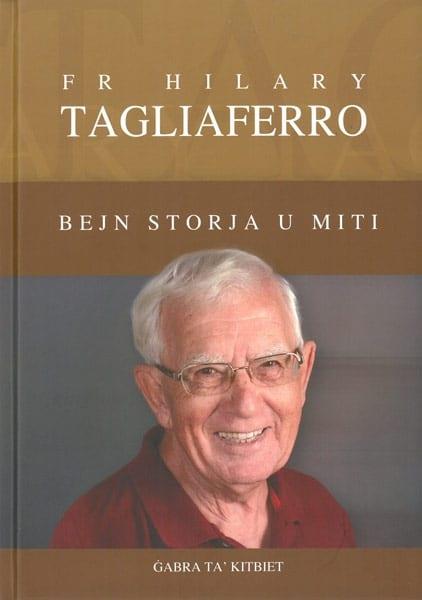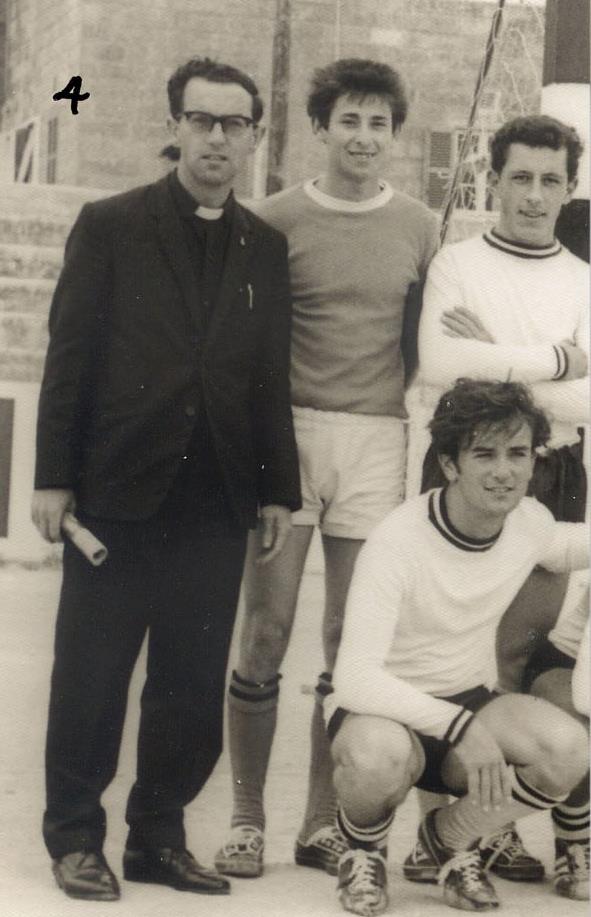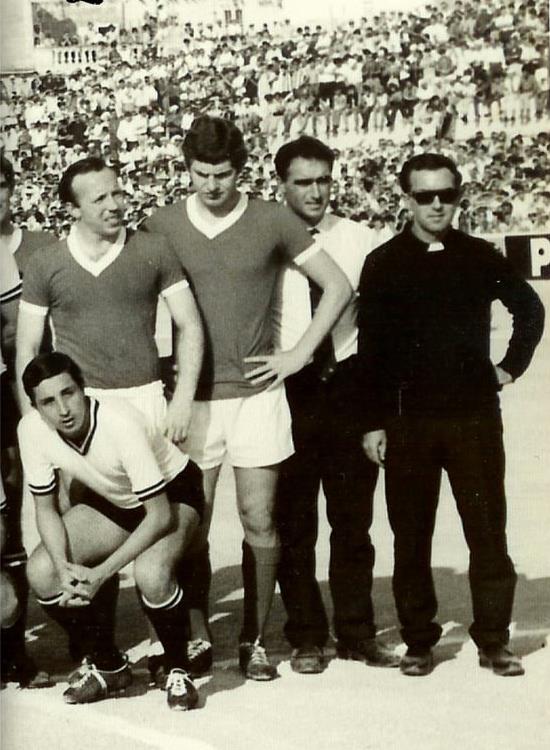Fr Hilary Tagliaferro was born in Tarxien on 28 October 1934. He is the son of William and Censina.
Fr Hilary remembers his early days, a child who passed through the difficult times of World War II. “For us war was time spent in the shelter and playing football in the streets. But behind it all, although difficult times, there was also happiness. I can’t remember a day when we were sad. Food was at a premium. Mum used to give us half a loaf of bread and I also recall being in the queue of the Victory Kitchen to have some balbuljata or minestra. On the education side I was lucky to have my aunt who used to teach me the basic things.”
But what is the educational background of Fr Hilary? “In 1945/46, after the war ended, I started attending Tarxien Primary School and subsequently progressed to the Liceo in Hamrun. At that time entry into this school, which was the top, required sitting for a common entrance exam. After that I started my studies to become a priest, starting at the tender age of 17.”
“I just wanted to live like the monks at Tarxien. I used to look at them and say, one day I want to be with them. At that time I attended the Oratorju for Latin private lessons given by Father Egidio.

Fr Hilary Tagliaferro wins the Premju Anzjanità Attiva
“After a couple of years I was sent to Rome. I was in the Eternal City for about four years and that time helped me to decide which way I wanted to go. I rather considered them as formation years and not study years. I met and mixed with a lot of different nationalities, among them a lot of Brazilians. An added incentive was that sports was given its due importance, so for me I had everything over there.”
Back in Malta Fr Hilary officiated his first mass in 1958. “Yes it’s now nearly 64 years. And a year later I was at l-Oratorju in Tarxien doing what I liked, mingling and taking care of children and youths. Difficult times were ahead since the 60s were characterised by political turmoil and a lot of children who weren’t allowed to attend certain places came to l-Oratorju, especially those who loved football. During that time I realised that God wanted me to live my life among children and youths. That was a fertile field, which I had to explore and exploit.”

A fitting tribute to Fr. Hilary – The book ‘Bejn Storja u Miti’ of Sergio Grech
But how did Fr Hilary’s interest in football start? “It was from l-Oratorju. We organised an Under 16 league which was later extended around Malta. This generated great interest in football. When the clubs started registering players for the Minors’ League, I took charge of both Tarxien and Hibernians since these were all children who attended l-Oratorju.”
“In the 70s after I finished from l-Oratorju and also from being the Hibernians’ coach, I started thinking of a dream that I had… establishing a school of football. Since I had already started my journalistic career I had already visited Celtic Park, Real Madrid and Coverciano, among others. And for those times the facilities over there were second to none. And so my dream turned to reality when Centru Sport Edukattiv was set up. I gathered a good number of PE teachers with the likes of Guzi Bugeja, Ronnie Attard, Lino Bugeja and Joe Attard, to mention a few. For starters we had over 400 children, boys and girls, since it was not only football but gymnastics, basketball, athletics and later on tennis. Mentioning football, over 10 players of the national team, coached by Dobrev and Heese, got their formation from Centru Sport Edukattiv.”
But the energetic priest was also meant to be a head coach of one of the main teams on our island. “The work I had done at l-Oratorju produced a number of good players who were now playing with Hibernians’ first team. The Hibs committee came over to hire me as their coach and I accepted. There were players my age namely Anastasi, Theobold and Delia. This encouraged me to further my studies and I also wanted to further my coaching knowledge, so I attended a number of courses abroad.”

With the youths at the St Augustine’s Oratory (the famous Tfal tal-Oratorju a cradle of future Hibernians stars – Lorry Young is the player squatting, to name just one);
A priest being a coach was a first for Malta and also for the world. “Yes, in that level, for sure it was a first.”
Fr Hilary was also, for many years, one of the top Maltese journalists. “I started with a column, once a week, in Il-Haddiem with later daily and subsequently Il-Hajja. In 1970 I was called to cover the World Cup in Mexico for this newspaper. I had an edge over the other journalists since all around the world I had free accommodation due to the fact that I used to go and settle in an Augustinian priory.”
“Learning that I was going to be in Mexico, Lewis Portelli and Joe Grima called me and asked if it was all right for me to give them a short telephone call every morning during the 6.45am Sports News on Radio Malta. During those times these were rather very popular, as I still meet people who recall these calls, which now date back to over 50 years. That was the start of my television career which lasted over 20 years. For me journalism gives you opporunities to meet great players and athletes. At that time there was only the state broadcaster, Xandir Malta, so we had exclusivity in everything.”

Winning his first Johnnie Walker League Cup with Hibernians
Fr Hilary’s journalistic career gave him the opportunity to meet a number of prominent people, among them one of the all-time greatest players. “Yes I got to know Pele during the 1970 World Cup. I was lodging not far away from his hotel and a fellow colleague, who was a close friend of the leggendary player, introduced me to him. We became friends and every World Cup he used to invite me over to his hotel for lunch. Among these episodes is the famous visit Pele made in Malta when we made a great show at the Empire Stadium which included the participation of the children from Centru Sport Edukattiv. It was not just Pele since I met other players namely Maradona, Bobby Charlton, George Best, Franz Beckenbaur and many more.”
Fr Hilary was also involved within the MFA sector with particular attention to the Youth and Technical Centre. “I was a very close ally of ex-MFA president George Abela and we practically made it into the MFA during the same period under the tenure of Jo Jo Mifsud Bonnici as president and secretary Eugenio Bonello. When George Abela was elected president of the Association we started the training grounds and even the Technical Centre, thus moving from Marsa.”

Before the home match against Man United at the Gżira Stadium
“Also that was the time that various nurseries started. I still remember the pioneer teams like Hamrun Liberty, Hibs Ghajn Dwieli and B’Bugia Windmills. So it was my duty to organise a new structure.”
Talking about youths Fr Hilary was the president, until lately, of the Youth FA. “The YFA is my baby. For over 30 years I was the president of this Association. I started by the formation of all leagues in different categories. A league, which is still alive and kicking. Now that the MFA has embarked on a restructuring exercise, which we gladly named Inhobb il-Football, I wanted that this work will be done by someone who has some expertise in this field. And I was positively surprised when I contacted Norman Darmanin Demajo and he accepted. I never taught that he was going to say yes. But Norman accepted it as a challenge rather than a demotion since a few years back he was the president of the MFA.”
Fr Hilary was also president of the Malta Sports Writers Association. “I still recall the moment when we were accepted as members of the A.I.P.S. back in the early 70s in Munich. I was president of the local Association for over 17years. The Association’s role is still important since it can bridge problems that can arise from time to time apart from being the voice of all sports’ journalists.”
Away from football and sport Father Hilary will be remembered also for the monument that he created in the heart of Paceville, the mecca of entertainment. “I describe the Millenium Chapel as a logical conclusion of my sport life. Sport made me meet a lot of people especially children and youths. I know their feelings more than others since I was always near this sector and I could not tolerate that a group of them were being ruined by alcohol and drugs. I think that the Millenium Chapel was created 10 years in arrears since the Paceville peak was in the 80s. And my thinking was that there was everything apart from the presence of God. Let’s be clear the majority that attend Paceville behave well. It’s only the minority that decide to ruin their lives with certain addictions which at times is not their fault.”

Fr. Hilary at the train station in London together with the Hibs’ players on their way to Manchester to play the Champions’ Cup match at Old Trafford against United
“I want to add that the presence of God increased the awareness in understanding why life is so beautiful. Today we have diversified our objectives since we help poor people and those who are in need. We even give free counselling.”
And turning to his culinary preferences Father Hilary is not that fussy about his eating habits but he mentions fish as being his favourite plate. And having travelled a lot he doesn’t hesitate to mention his favourite destination. “Rome remains Rome. The eternal city. I was there during my formative years for four years. I still regard it as my second home.”
Before ending this interesting interview with a priest who was so close to youths, it goes without saying in asking him if he misses family life. “Yes an interesting question. I truly miss family life and being a parent. But I had a bigger family during my lifetime. I think that the way forward is that a priest can be married and also raise a family. In bringing priesthood on the same level as marriage we will elevate the importance of family life. I believe that a priest can be dedicated to both God and family.”
Fr Hilary, who loves birds, classical music and swims practically every day, ended this interview with a clear message: “I loved life and lived it to the full. God gave us this life to live it to the maximum. Be positive, use your talents and always appreciate what you are.”

(From left) Norman Darmanin Demajo, Fr Hilary Tagliaferro, Dr George Abela and Bjorn Vassallo during the FSR Committee meeting.